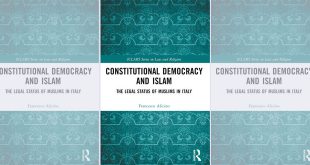The Study is divided into two main sections, one on “colonizing Muslim law,” with contributions on South Africa, Kenya, Sudan, Niger, French Soudan [Mali], and Senegal; and a second on the post-colonial state and constitutionalism, covering Nigeria, Kenya, Tanzania and South Africa.
This volume brings together twelve essays that in various ways explore the histories of Islamic law in Africa. All these essays share a concern with the encounter between Islamic law and the colonial or post-colonial state. Justas there was no single ‘Islamic’ law in Africa, there was also no singular en-counter. Instead, there were a variety of encounters and changes in the nature of these engagements over time. Most of these encounters led to narrowing the practice of shari’a to issues relating to personal status or family law, as we describe it. The legacy of these engagements remains deeply embedded in post-colonial legal systems, political mobilization, and identity politics. Thus, to understand the issues surrounding contemporary claims by millions of Muslims for ‘full shari’a in Nigeria and Sudan, we must understand the historical contexts producing these claims. The essays in this volume bring together historians, legal and constitutional scholars, anthropologists, and religious studies experts in a conversation that enriches the study of Islamic law in Africa.
About the Authors
Shamil Jeppie is associate professor in the Department of Historical Studies at the University of Cape Town.
Ebrahim Moosa is associate professor in the Department of Religion at Duke University.
Richard Roberts is professor in the Department of History at Stanford University.
Bibliographic Information
Title: Muslim Family Law in Sub-Saharan Africa: Colonial Legacies and Post-Colonial Challenges
Editors: Shamil Jeppie, Ebrahim Moosa and Richard Roberts
Publisher: Amsterdam University Press
Language: English
Length: 392 pages
ISBN: 978-9089641724
Pub. Date: 1 November 2009
 Ijtihad Network Being Wise and Faithful Muslim in the Contemporary World
Ijtihad Network Being Wise and Faithful Muslim in the Contemporary World

